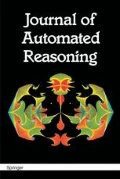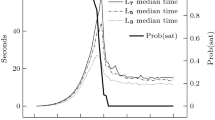Abstract
Although it is well-known that every satisfiable formula in Łukasiewicz’ infinite-valued logic \(\mathcal{L}_{\infty}\) can be satisfied in some finite-valued logic, practical methods for finding an appropriate number of truth degrees do currently not exist. Extending upon earlier results by Aguzzoli et al., which only take the total number of variable occurrences into account, we present a detailed analysis of what type of formulas require a large number of truth degrees to be satisfied. In particular, we reveal important links between this number of truth degrees and the dimension, and structure, of the cycle space of an associated bipartite graph. We furthermore propose an efficient, polynomial-time algorithm for establishing a strong upper bound on the required number of truth degrees, allowing us to check the satisfiability of sets of formulas in \(\mathcal{L}_{\infty}\), and more generally, sets of fuzzy clauses over Łukasiewicz logic formulas, by solving a small number of constraint satisfaction problems. In an experimental evaluation, we demonstrate the practical usefulness of this approach, comparing it with a state-of-the-art technique based on mixed integer programming.
Similar content being viewed by others
References
Aguzzoli, S.: An asymptotically tight bound on countermodels for Łukasiewicz logic. Int. J. Approx. Reason. 43, 76–89 (2006)
Aguzzoli, S., Ciabattoni, A.: Finiteness in infinite-valued Łukasiewicz logic. J. Logic Lang. Inf. 9, 5–29 (2000)
Aguzzoli, S., Gerla, B.: Finite-valued reductions of infinite-valued logics. Arch. Math. Log. 41, 361–399 (2002)
Bobillo, F., Bou, F., Straccia, U.: On the failure of the finite model property in some fuzzy description logics. Fuzzy Sets Syst. 172(1), 1–12 (2011)
Bobillo, F., Straccia, U.: Fuzzy description logics with general t-norms and datatypes. Fuzzy Sets Syst. 160(23), 3382–3402 (2009)
Bollobás, B.: Modern Graph Theory. Springer (1998)
Hähnle, R.: Towards an efficient tableau proof procedure for multiple-valued logics. In: Börger, E., Kleine Büning, H., Richter, M., Schönfeld, W. (eds.) Selected Papers from Computer Science Logic, pp. 248–260. Springer-Verlag (1991)
Hähnle, R.: Many-valued logic and mixed integer programming. Ann. Math. Artif. Intell. 12, 231–264 (1994)
Hähnle, R.: Tutorial: Complexity of many-valued logics. IEEE International Symposium on Multiple-Valued Logic, pp. 137–148 (2001)
Hähnle, R., Escalada-Imaz, G.: Deduction in multivalued logics: a survey. Mathw. Soft Comput. 4(2), 69–97 (1997)
Hájek, P.: Metamathematics of Fuzzy Logic, pp. 155–174. Kluwer Academic Publishers (1998)
Hoffman, A., Kruskal, J.: Integral boundary points of convex polyhedra. Ann. Math. Stud. 38, 223–246 (1956)
Jackson, D., Vaziri, M.: Finding bugs with a constraint solver. In: ISSTA ’00: Proceedings of the 2000 ACM SIGSOFT International Symposium on Software Testing and Analysis, pp. 14–25. ACM, New York (2000)
Janssen, J., Heymans, S., Vermeir, D., De Cock, M.: Compiling fuzzy answer set programs to fuzzy propositional theories. In: Proceedings of the 24th International Conference on Logic Programming, pp. 362–376 (2008)
Kautz, H., Selman, B.: Planning as satisfiability. In: Proceedings of the 10th European Conference on Artificial Intelligence, pp. 359–363 (1992)
Kavitha, T., Mehlhorn, K., Michail, D., Paluch, K.: An o(m 2 n) algorithm for minimum cycle basis of graphs. Algorithmica 52, 333–349 (2008)
Lin, F., Zhao, Y.: ASSAT: computing answer sets of a logic program by SAT solvers. Artif. Intell. 157(1–2), 115–137 (2004)
McNaughton, R.: A theorem about infinite-valued sentential logic. J. Symb. Log. 16, 1–13 (1951)
Mitchell, D., Selman, B., Levesque, H.: Generating hard satisfiability problems. Artif. Intell. 81(1–2), 17–29 (1996)
Mundici, D.: Satisfiability in many-valued sentential logic is NP-complete. Theor. Comp. Sci. 52, 145–153 (1987)
Mundici, D., Olivetti, N.: Resolution and model building in the infinite-valued calculus of Łukasiewicz. Theor. Comp. Sci. 200, 335–366 (1998)
Olivetti, N.: Tableaux for Łukasiewicz infinite-valued logic. Stud. Log. 73(1), 81–111 (2003)
Pavelka, J.: On fuzzy logic. Zeitschr. F. Math. Logik Und Grundl. Der Math. 25, 45–52, 119–134, 447–464 (1979)
Pham, D., Thornton, J., Sattar, A.: Modelling and solving temporal reasoning as propositional satisfiability. Artif. Intell. 172(15), 1752–1782 (2008)
Schockaert, S., De Cock, M., Kerre, E.: Spatial reasoning in a fuzzy region connection calculus. Artif. Intell. 173, 258–298 (2009)
Schockaert, S., Janssen, J., Vermeir, D., Cock, M.: Finite satisfiability in infinite-valued Łukasiewicz logic. In: Proceedings of the 3rd International Conference on Scalable Uncertainty Management, pp. 240–254 (2009)
Smyth, B., McClave, P.: Similarity vs. diversity. In: ICCBR ’01: Proceedings of the 4th International Conference on Case-based Reasoning, pp. 347–361. Springer, London (2001)
Straccia, U., Bobillo, F.: Mixed integer programming, general concept inclusions and fuzzy description logics. Mathw. Soft Comput. 14(3), 247–259 (2007)
Tamura, N., Taga, A., Kitagawa, S., Banbara, M.: Compiling finite linear CSP into SAT. In: Proceedings of the 12th International Conference on Principles and Practice of Constraint Programming, vol. 4204 of Lecture Notes in Computer Science, pp. 590–603 (2006)
Wagner, H.: A new resolution calculus for the infinite-valued propositional logic of Łukasiewicz. In: Proceedings of the International Workshop on First order Theorem Proving, pp. 234–243 (1998)
Xu, L., Hutter, F., Hoos, H., Leyton-Brown, K.: SATzilla: portfolio-based algorithm selection for SAT. J. Artif. Intell. Res. 32(1), 565–606 (2008)
Zhang, L., Malik, S.: The quest for efficient boolean satisfiability solvers. In: Proceedings of 14th International Conference on Computer Aided Verification, vol. 2404 of Lecture Notes in Computer Science, pp. 641–653 (2002)
Author information
Authors and Affiliations
Corresponding author
Additional information
Steven Schockaert is a Postdoctoral Fellow of the Research Foundation - Flanders (FWO).
Rights and permissions
About this article
Cite this article
Schockaert, S., Janssen, J. & Vermeir, D. Satisfiability Checking in Łukasiewicz Logic as Finite Constraint Satisfaction. J Autom Reasoning 49, 493–550 (2012). https://doi.org/10.1007/s10817-011-9227-0
Received:
Accepted:
Published:
Issue Date:
DOI: https://doi.org/10.1007/s10817-011-9227-0




